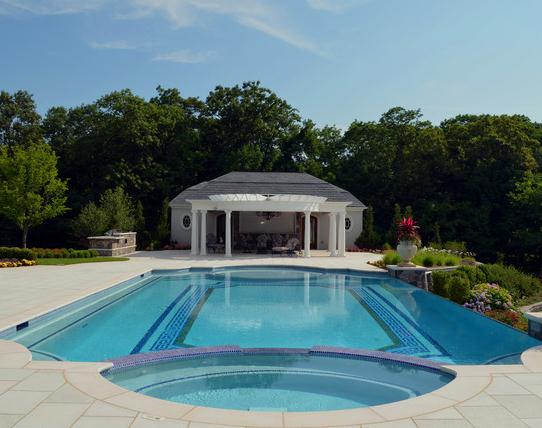How to Install Glass Mosaic Tile in a Swimming Pool?
Posted By Becky on April 16, 2014
 Mosaic glass tiles installed in a swimming pool are growing in popularity due to their versatility and functional qualities. Glass tiles won’t warp or fade and require much less maintenance than previously common ceramic or porcelain tiles. Additionally, glass tiles reflect light in such a way that makes them appear iridescent and sparkling, giving your pool a much brighter and inviting appearance.
Mosaic glass tiles installed in a swimming pool are growing in popularity due to their versatility and functional qualities. Glass tiles won’t warp or fade and require much less maintenance than previously common ceramic or porcelain tiles. Additionally, glass tiles reflect light in such a way that makes them appear iridescent and sparkling, giving your pool a much brighter and inviting appearance.
1. Drain the pool completely. Chip, grind or bush hammer away any high spots along the liner of the pool. Chip away debris from around pipes and lights with a light chipping hammer.
4. Install an elastomeric membrane according to the manufacturer’s directions, which installation varies widely by manufacturer. Installation and curing of the membrane takes approximately six days.
5. Dampen the surface of the pool to saturated surface dry again. Clean the back side of the mosaics to remove any dust resulting from the manufacturing process.
6. Mix glass mosaic tile adhesive with water at a ratio of 3 to 1. Continue mixing to a creamy consistency and then leave the mix to stand for 5 minutes. Stir again and then use immediately. Do not mix more adhesive than you can use in 15 minutes or it will begin to set before installation and will not bond efficiently with the tiles.
7. Spread the adhesive mixture over a small area of the pool surface at the highest part of the shell using the notched trowel. Install one sheet of tile over the adhesive. Hammer the tiles gently with a rubber grout float. Set a second sheet of tiles in the same manner. Hold a level against the two sheets of tiles to verify they are evenly installed. Tap as needed to level off any wavy or high spots. For mesh sheeting, wipe away any excess adhesive from the surface of the tiles with a cloth immediately. Continue installing tiles in this manner until you have placed all the full sheets of tile possible.
8. Score the paper, plastic sheeting or mesh holding the tiles together with a utility knife to cut smaller pieces needed for the perimeter of each wall. Install the tile in the same manner as full-sized tile sheets. Peel away paper sheeting after the adhesive cures for 20 minutes. Do not peel plastic sheeting until the adhesive fully cures.
9. Cover the pool. Leave the adhesive to cure according to manufacturer’s instructions, checking often to determine when it is fully cured. Temperature, humidity and wind conditions will affect the drying process and you cannot proceed with grouting the tiles until the adhesive completely cures.
10. Moisten the mosaic with a damp sponge. Grout the mosaic with an epoxy grout mixture and a rubber grout float held at a 45-degree angle. Gently scrape away any epoxy grout on the surface of the mosaics with the grout float held diagonally.
11. Scrub the surface of the mosaics with the scrubber provided with the epoxy grout and water after 45 minutes. Then rub the mosaics with a clean cloth to remove any remaining residue. Leave the grout to cure for 24 hours, then rinse any haze left on the tiles with water.
12. Shoot caulk in all of the expansion joints using a caulking gun, taking care to fill in all the joints completely. Wipe away any caulk from the surface of the tiles immediately.
13. Wait 20 days for all surfaces to fully cure before filling the pool with water. Fill the pool at a rate of 1-inch per hour.
Comments
Leave a Reply